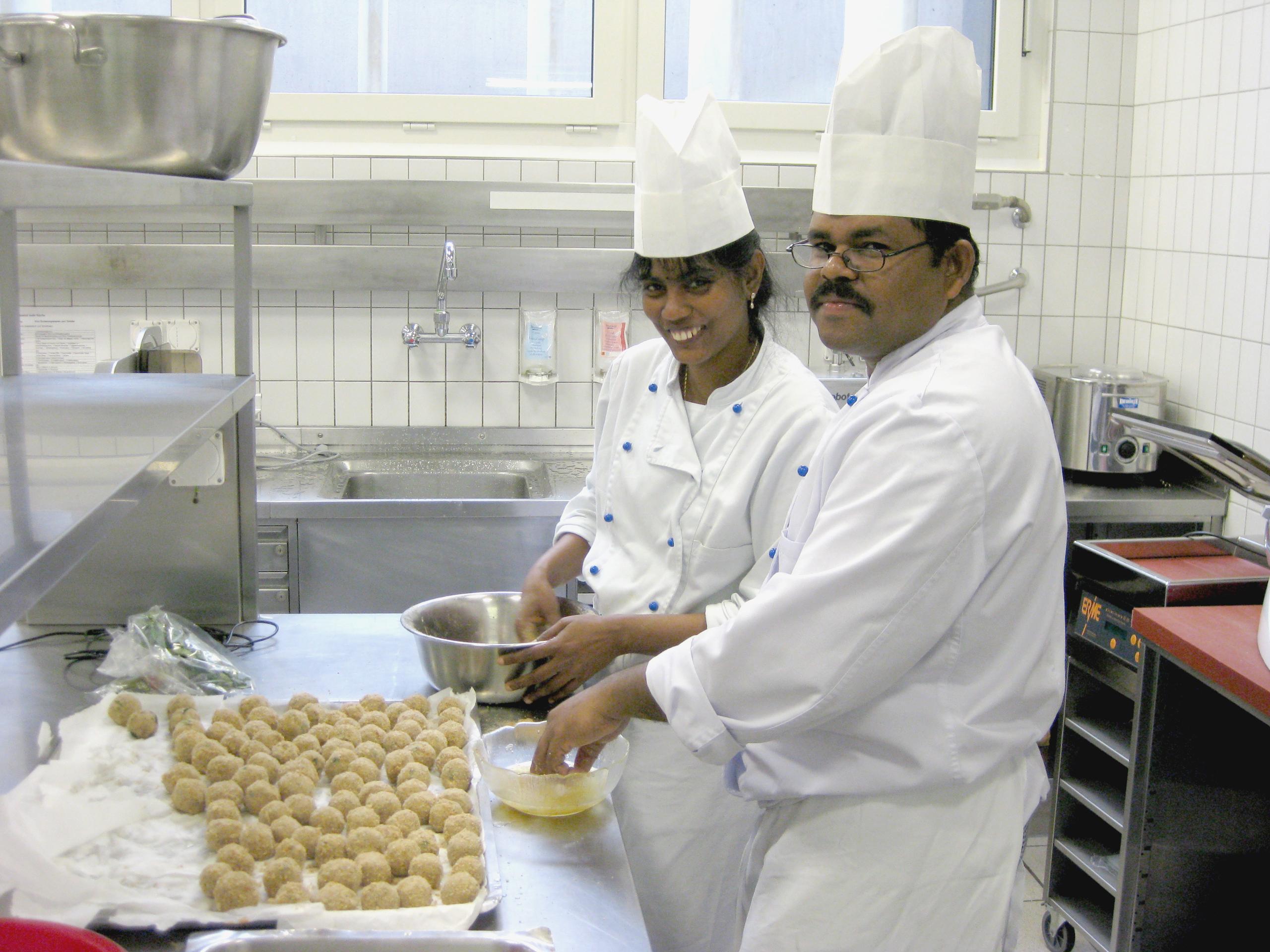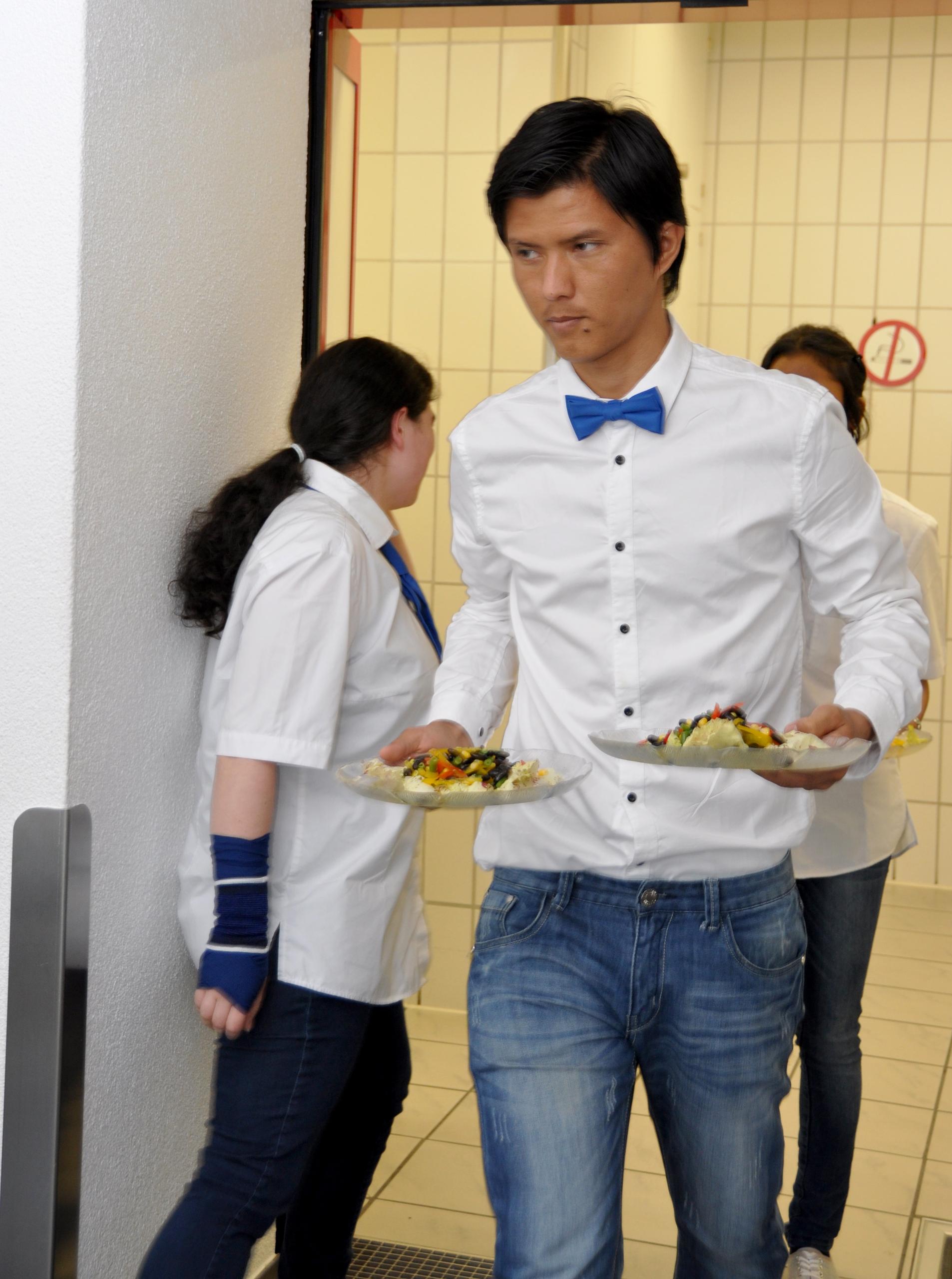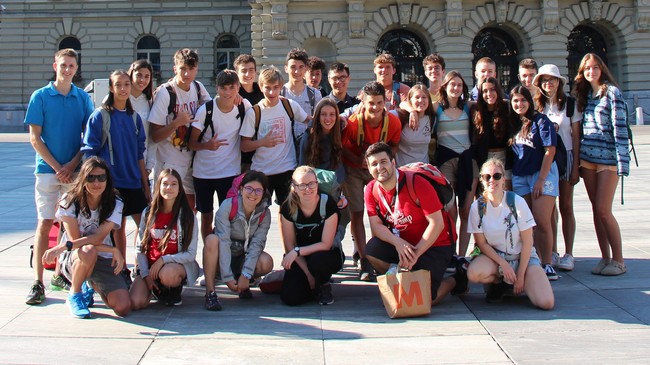
Apprenticeships for refugees get a reboot

After first testing the waters a decade ago, Switzerland wants to give refugees access to its apprenticeship system with a new national initiative. But it won’t happen overnight.
Back in Cuba, Tamila Garcia Quintero was a librarian. That was before she fled the country as a political refugee and ended up in Switzerland with her mother and daughter 15 years ago.
“I was always at the unemployment office looking for jobs but couldn’t find anything,” she told swissinfo.ch of life a few years after her arrival. It became clear that she wasn’t going to find work doing what she had done in Cuba, so in 2006, she signed up for a one-year apprenticeship for refugees that would teach her how to help out in a kitchen or restaurant and give her a diploma at the end. It was a pilot project spearheaded by then-justice minister Christoph Blocher, intended to combine language learning and integration measures with apprentice-style “learning by doing” in three offerings around the country.
The first class of students in that food service apprenticeship came from all over the world – Iran, Sri Lanka, Tibet, Togo, Turkey. The only thing they had in common was that they were all refugees who had gotten Swiss residence permits and were looking for work.
When that programme launched in 2006, about three-quarters of the country’s recognised refugees were unemployed. And the numbers haven’t improved – a 2014 study from the UNHCR showed that, despite many training offerings at a cantonal level, only about one in five refugees had found work in the first five years after their arrival, during which time the federal government is still legally responsible for them.
So in December 2015, cabinet approved reviving the “apprenticeships for refugees” pilot programme, under a broader nationwide initiative that would match employer needs with refugees ready to work.
There is some urgency to the situation: more asylum seekers are arriving every day, a larger percentage of whom end up staying in Switzerland than in the past.
And more and more Swiss-based companies – especially in certain fields – are struggling to find apprentices. Then there’s the decision made by Swiss voters two years ago to limit immigration from the European Union and prioritise the domestic labour market.
“In light of that vote we were asked to think about how we could more effectively and specifically take advantage of refugees’ labour market potential, alongside what is already underway,” said Eric Kaser, deputy head of the integration section at the State Secretariat for Migration SEM.
His team found two gaps in the system: language learning wasn’t being addressed early enough, and not enough connections were being made between the needs of the labour market and the skills offered by refugees.
Laying the groundwork
Garcia Quintero agrees that language learning is key.
“It was good to have a mix of ages and backgrounds in the class,” she says, reflecting on her 2006 apprenticeship. “But it would have been better if everyone had had a similar level of German skills.”
Kaser says the migration office appreciates the need to begin training refugees as early as possible, ideally even before the decision is made as to whether they will be allowed to stay in Switzerland. But that brings up complicated legal questions – the current law on foreigners in Switzerland doesn’t technically allow them to receive training before they’re granted a permanent residence permit.
The government’s support of the latest apprenticeship pilot programme legitimised operating within that legal grey area, Kaser says. Now, authorities can test out strategies to help refugees with good long-term prospects of being able to stay in Switzerland work on language skills even before their asylum decision is handed down.
“We want people with longer-term potential of being allowed to stay – like those from Eritrea, Afghanistan or Syria – to receive specific, intensive language training early on,” he explains.
PLACEHOLDER
Matching needs to jobs
Ali Soltani, another graduate of the first refugee apprenticeships class ten years ago, waited nearly two years for the authorities to decide whether he could stay in the country. He had worked in the restaurant industry in his home country of Iran, so when he finally got the chance to train in Switzerland, the food service offering was a good fit.

Soltani found a job after the course, but it was in a totally different field, doing installations in a laboratory. He’s still there now but would like to strike out on his own and return to the food service business, also because he says he hasn’t gotten a raise in years.
“The apprenticeship certainly helped me to find a job, because I had a reference and proof that I had done something,” he said.
But he says it’s still not entirely clear to him, ten years later, what the diploma he earned actually qualifies him to do.
Part of the confusion may stem from the multitude of training programmes offered for refugees in Switzerland, each one slightly unique depending on the canton. The pilot programmes tested in 2006 eventually became cantonal offerings, no longer run on a national level.
With their latest apprenticeship scheme, the government and the migration office hope to better match the needs of the economy with the workers ready to fill them, ultimately giving refugees access to the same apprenticeship system to which 70% of Switzerland’s young people belong.
“A few years ago there were outlying examples of companies that were offering such opportunities,” Kaser says. “Today we’re noticing a snowball effect of companies seeing the potential to recruit motivated young refugees because many have trouble finding enough apprentices.”
No quick fix
But organising it will take time. 2016, says Kaser, is all about talking to the cantons, figuring out which existing programmes to adjust, and presenting a proposal for financing by the end of the year. It will be 2017 or 2018 at the earliest before instructors are hired and structures are created to match companies with refugee recruits.
“It’s a long-term project,” he says. “But we hope it will result in a longer-lasting situation than if we do short-term offerings, because people tend to not find long-term success in those jobs. If they do an apprenticeship, their prospects are different.”
Garcia Quintero did eventually find long-term work, after a few more go-arounds at the unemployment office. She now works part-time as a food service assistant at a school, hoping to pick up more hours after a colleague retires.
When she sees former classmates from her apprenticeship around town, she always asks them how they’re doing.
It took a while, especially for the older ones – but “they all have jobs now,” she says.
Background
Who’s paying?
The initial refugee apprenticeship programmes launched ten years ago were “quite expensive”, according to Eric Kaser of the migration office, with the food service training costing about CHF30,000 per student. Once they got off the ground, cantons and other local institutions could decide how and whether to keep them going and also assumed most of the costs.
The latest nationwide apprenticeship programme will initially cost the government CHF50 million over four years.
“The goal is that the financing from the federal government will fall away after a few years and that the offerings continue with support from the existing cantonal structures and businesses,” Kaser explains.
Contact the author on Twitter: @vdevoreExternal link

In compliance with the JTI standards
More: SWI swissinfo.ch certified by the Journalism Trust Initiative
















![The four-metre-long painting "Sonntag der Bergbauern" [Sunday of the Mountain Farmers, 1923-24/26] had to be removed by a crane from the German Chancellery in Berlin for the exhibition in Bern.](https://www.swissinfo.ch/content/wp-content/uploads/sites/13/2025/12/01_Pressebild_KirchnerxKirchner.jpg?ver=cb688ed5)















You can find an overview of ongoing debates with our journalists here . Please join us!
If you want to start a conversation about a topic raised in this article or want to report factual errors, email us at english@swissinfo.ch.